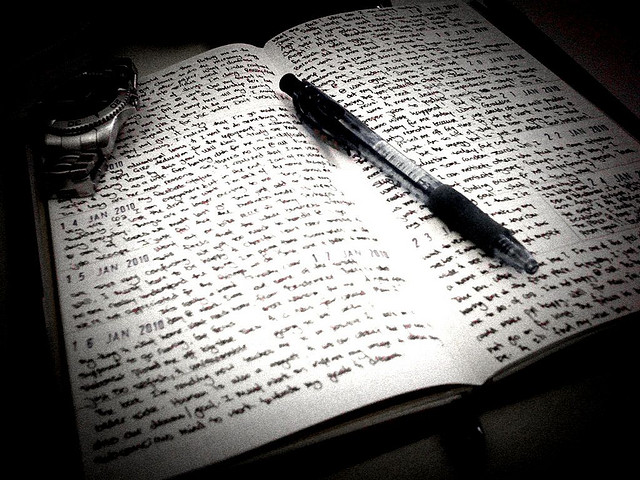Some of my first memories of my mother include her being sad, in some capacity. That is a very sad thing to say, I realize this now. Likely, on some level, I realized it then too. Growing up, I couldn’t understand her sadness, couldn’t access the dark places she must have dwelled. As far as I knew, I came from a family of sound minded people who scoffed at the idea of therapy in any form.
And then, at the home of my grandfather, my mother (by this point, an alcoholic) revealed to me that my great grandmother, a woman I’d never met, had committed suicide when she was a fairly young woman, around thirty. She left behind a few children, and a legacy of secrecy. My mother’s depression had happened around the time that she was thirty and as I grew closer to that age myself, I realized that my feelings of sadness were more than that. They told of a history of women and mental illness and social stigma. They told a story about the ways mental illness can destroy most of the women in a family before they even realize it.
I could say that it was therapy and puppies and yoga that saved me from impending depression—it was, and I’ve written about it. I could say that I’m free of it, that I feel great all of the time, that I never question those darker parts of the self that are dormant, usually—but I’d be lying. The truth is that I still get depressed, that I have to actively seek out ways to make myself feel better on a weekly basis. That writing, ultimately, is my thing, that special outlet that keeps me away from depression, and drugs and alcohol and rehab, which I’m also prone to.
While mental illness is more, as my father points out, of “my mother’s thing”, drug addiction is more of his. He began as a pot head (on the way to the hospital to give birth to me, my mother had to stop to make a delivery), he’s dabbled, however briefly, in cocaine, crack, pills—ending, most recently, with meth production and consumption, for which he spent time in jail. He’s never been to rehab, though I know (in my professional experience) that it would benefit him. Instead, he’s still an alcoholic, something I’m willing to begrudgingly accept because it is better than the alternative. He’s turned to grandfather-hood and God as part of what he identifies as a nontraditional, non twelve step recovery program. His path is not mine, his story not mine either.
Lydia Yuknavitch writes, in The Chronology of Water, “Language is metaphor for experience. It’s as arbitrary as the mass of chaotic images we call memory—but we can put it into lines to narrativize over fear.” For me, this remains true. By writing about my experience (and the experience of my family, though I struggle in that it is not my story to tell) in as honest a way as I find possible, I am able to work toward a future that does not include taking the path of my relatives—addiction or depression or a punch of pills in a cave in the Wyoming woods.
Photo by Justin See






Emma,
Very personal and well-written.
I agree that writing can be very helpful to one who wants to honestly leave that state called depression.
I have dozens of pages in written journals that will testify to the long journey. In some respects, I think the writing has helped. In other respects, I think it has prolonged the state I was in because it was a re-hash of what had already been written about numerous times.
When in a “very dark place” (as I call it) it’s incredibly difficult to see a way out, especially when others around you are in a totally different place even when they are right next to you.
I won’t go long on this comment. I just wanted you to know I read what you took the time to write and I appreciate your efforts.
Keep going!
Emma, I echo the sentiments expressed by Tim.
I am a firm believer that writing about our diverse challenges does lead to healing … and if it does not heal completely, it certainly helps.
Thank you for sharing. You are touching and helping strangers.
Wonderful post. Very honest and brave.
Thank you for sharing such a personal, honest and moving post.
I have found that in writing down my story , then going back to it at a time further along in life, makes me realize that change really does take place in our lives and mostly for the better.
Up until a few days ago, I would possibly not have concurred with you.
I recently started writing random, honest, and deep stuff about me and my life, and sending it to peers. I am feeling incredibly better and more powerful. It is helping me shed quite a lot of baggage off my shoulders.
Thanks for sharing.
I used to write for therapeutic reasons, when I was younger, but at a certain age I just stopped. Maybe I had lost faith in it’s power, or maybe I felt more comfortable just surrendering myself to the futility that I felt to be overwhelming.
These days I’ve taken to writing once more, and I’m gradually making some slow progress.. but like you, it’s not a final victory, it’s a process. A few times a week, I’ll find myself falling back into bad habits and depression, and I have to make the effort to help myself change my perspective.
I wish you the best of luck onward, and I have faith that you will be able to overcome both nature and nurture. Have a lovely Sunday.
An honest tale. Thank you for sharing it.
Writing is a cathartic release for me although I find it so difficult to remember that on the days when the depression and negative thoughts are distorting my perception of things those days most things seem pointless. I would like to put words down on paper someday about my journey and family legacy of mental illness and substance abuse . I am not sure how I feel about it not being all my story to tell, so I understand the gentle honesty with which you approach the subject. I doubt I would ever have the courage to share my story.
Thank you for sharing your words. They remind me that I am not the only one that has watched their parent live with an addiction and faced the difficulties that depression presents.
Writing is like giving shape to innermost thoughts, as Emma has done in this post. I am sure she must have felt a bit relieved in this kind of confessional, cathartic blog. This also gives hope for turning a new chapter in life.
I write for survival too :) Excellent article – thank you for being so honest.
Hi all,
I just wanted to thank you for your kind words and support. I’m so happy that many of you have found writing to be therapeutic. :) For me, the act of getting something down on paper (or screen) is in itself a useful tool. So nice that we’re able to give voice to our experiences in a safe, supportive space.
Kindest regards,
Emma
You’re brave to share your personal lives with us. I respect you for that.
I started keeping a diary almost one year ago and it helps tremendously. It’s like my own personal therapists that listens to me and gives me plenty of feedback and insights about my life.
Writing has indeed helped me deal and understand a lot about my childhood and how it has affected me.
Lastly… Fighting depression is a day in and day out battle. I can relate to that.
Beautifully written. Thank you for sharing your story. I grew up with addiction around me as a child though I never was drawn to any addictive substances.
I think that reframing our lives through narration can be extremely therapeutic. Bravo to you for having found your peace in writing. All the very best to you in your endeavours. I look forward to reading more of your articles in the future
:-)
It is hard, isn’t it, to know how to tell your story, as interwoven as it is with the stories of others, without crossing a certain line. Some people simply cross it, of course, but when those people are your family or friends, still alive and in your life, it can be hard to write as honestly about them as we might like – and perhaps not a good idea to do so!
Nonetheless, As Ash has said, reframing our own lives through narrative can be incredibly helpful. I hope it continues to serve you well.